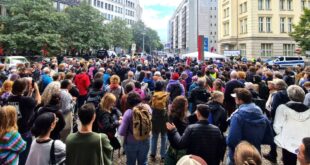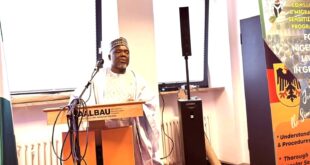An estimated 5,000 supporters of Germany’s far-right Alternative for Germany (AfD) party demonstrated in Berlin on Sunday “for the future of Germany” in the party’s largest gathering since it became Germany’s top opposition party. AfD supporters shouting “Merkel must go” were largely outnumbered by rival demonstrations, gathering about 20,000 people, according to police estimates, however. Excerpts of Jefferson Chase’s report of how AfD protesters were shouted down in Berlin.
On one side, some 5,000 supporters of the anti-immigration, anti-EU Alternative for Germany party (AfD). They congregated to express their discontent and often outright contempt for the policies of Chancellor Angela Merkel’s government, particularly her welcoming stance toward refugees.
On the other side and in the surrounding Tiergarten park, over 20,000 opponents of the AfD. They turned out to vent their discontent and often outright contempt for what they consider to be a return to the xenophobia and racism of Germany’s dark historical past.

In the middle, 2,000 police who managed to keep the two sides apart and ensure that the populists were able to hold their rally without a riot.
The day began at Berlin’s main train station where AfD supporters collected to hear speeches and assemble before marching the 1.3 kilometers to the Brandenburg Gate. Few of the demonstrators wore clothing or carried placards associated with right-wing extremists. This was very much the middle-class face of the AfD, self-described hard-working taxpayers who feel ill at ease in multicultural Germany and accuse the government of betraying their interests.
Anxiety over foreigners, hostility toward elites and patriotism were the themes recurring in the chants of the AfD crowd and the speeches held on the stages. One of the first speakers, 21-year-old Marie Thérèse Kaiser, spoke of her fear when encountering groups of Arab-speaking migrants on the train in her hometown.
“I felt powerless,” Kaiser said, before going on to list the names of German women allegedly raped by refugees, although she also admitted that the men on the train probably had not intended to be threatening and said that her best friend is Turkish.

No one in the audience seemed particularly interested in exploring the potential contradictions of such attitudes — and a mass rally would probably not be the appropriate forum anyway. For the right-wing populists, the answers to what another speaker called “the currently so threatening situation” in Germany are clear. Merkel should go, the country has to close its borders to undesirable foreigners, and the rule of law and order must be restored.
The latest police statistics show that crime is actually declining overall in Germany. But for the AfD crowds in Berlin that’s not the point. It’s the sense of being under threat and not any objective proof that made these people take to the streets.
Meanwhile some three hundred meters away from the train station, across the Spree River, thousands of people chanted “Nazis out” and “All Berlin hates the AfD” as the populists began moving toward the Brandenburg Gate. Thirteen counter-demonstrations were registered with the authorities, and police reckoned that opponents of the AfD outnumbered supporters by more than four to one.
A functioning democratic society, it is often said, must allow all opposing sides of issues to make their views heard. If so, the competing demonstrations in Berlin, which ended with only some minor scuffles, were a mark of democracy at work. At the same time, though, in terms of content, Sunday afternoon was little more than a mass shouting match. One that illustrated just how hardened the fronts in Germany have become, when the issue is Merkel’s policies on refugees.
© DW
 THE AFRICAN COURIER. Reporting Africa and its Diaspora! The African Courier is an international magazine published in Germany to report on Africa and the Diaspora African experience. The first issue of the bimonthly magazine appeared on the newsstands on 15 February 1998. The African Courier is a communication forum for European-African political, economic and cultural exchanges, and a voice for Africa in Europe.
THE AFRICAN COURIER. Reporting Africa and its Diaspora! The African Courier is an international magazine published in Germany to report on Africa and the Diaspora African experience. The first issue of the bimonthly magazine appeared on the newsstands on 15 February 1998. The African Courier is a communication forum for European-African political, economic and cultural exchanges, and a voice for Africa in Europe.


































